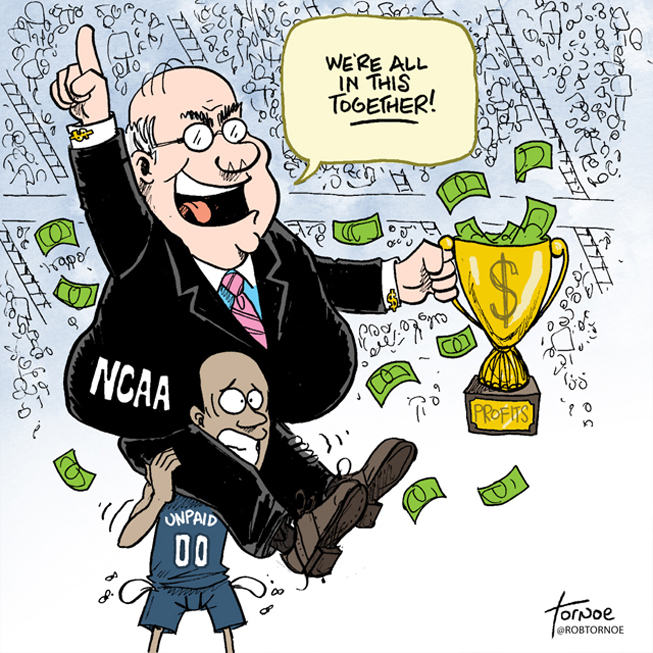To Pay or Not to Pay
Everybody wants to make money, including some high profile college athletes.
The debate rages on as to whether college athletes should be paid for their services, in the form of cash.
Paying college athletes has been a hot topic for years. Student athletes bring in hundreds of millions of dollars for the NCAA and get seemingly nothing in return. But change may be coming very soon.
The NCAA makes around 1 billion dollars a year, and a vast majority of that money comes from ticket sales, especially from the March Madness Basketball Tournament. Lots of people come to college sporting events just to see the best players in particular. A good example of this is the 2018-2019 Duke Basketball team. The team was lead by the top 3 players in that year’s freshman class as well as 2 other top 100 players.
Pitt on the other hand, was coming of an 0-18 conference record the previous year. Pitt’s average attendance was just above 4,000, less than half of full capacity. In contrast, when Duke came to play against Pitt, the arena was filled to capacity with over 12,000 people. In just that game, Duke made thousands of dollars for the NCAA from people who wouldn’t have shown up if Pitt was playing any other team.
So what do the players get?
Some will say that they get nothing, but the NCAA pours a good sum of money into scholarships and other financial aid and resources for athletes. Even though not directly, these athletes still receive money from scholarships. But for some, this may not be enough. Lots of great college athletes come from bad living situations and have families back home living paycheck to paycheck. With school and sports packing their schedules, it becomes nearly impossible to have another job to help support their families.
With so many restrictions on NCAA athletes, some top high schoolers have dodged the college route entirely. R.J. Hampton, one of the best high school basketball players in 2019, would have been an incoming freshman in college this year. Hampton received numerous scholarship offers to some of the best basketball schools in the country, but decided to skip college altogether. Instead of going to college and making no money, Hampton will be playing in New Zealand this season making more than 100,000 dollars while other top players play for nothing.
You may be asking, if these players are so good, why don’t they just go straight to the NBA? They can’t. In 2005, the NBA made a rule that required players to be at least 19 years old and out of high school for at least a year to be drafted. Before 2005, high school superstars like Lebron James and Kobe Bryant were drafted immediately after they graduated and have cemented themselves in NBA history. Lots of people want to see this rule changed, but for now no change is in sight.
Because players can’t go straight to the NBA, so called “one and done” players are becoming extremely common. These one and done players play one year of college and immediately go to the NBA. Players like Kyrie Irving, Kevin Durant, and Derrick Rose all went to college for one year and immediately went to the NBA. With one and done players come one and done schools. These top basketball schools scout the best high school talent every year, often making deep playoff runs. Then, they ship out their best players to the NBA and bring in the newest recruits and repeat the process. Schools like Duke, Kentucky, Michigan State and Kansas are famous for their one and done system.
Changes to NCAA rules may be coming. California State Senator Nancy Skinner recently proposed a bill called the Fair Pay To Play Act. The bill would allow athletes from all public colleges and universities in the state to be paid through indirect sponsorships. It would also make it illegal for schools and the NCAA to punish players for sponsorships or place restrictions on these deals.
Some people think this is a great step towards compensating players for their efforts, but some aren’t so enthusiastic. Former Heisman Trophy winner and Florida Quarterback Tim Tebow had some choice words for those who think athletes should be paid. “If I could support my team, support my college, support my university, that’s what it’s all about. Now we’re changing it from us, from we, from my university, from being an alumni, which makes college football and college sports special to it’s not about us, it’s not about we, it’s just about me.” Tebow and others think that paying players will cause a selfish attitude that more and more professional athletes seem to have.
So will these changes go into effect? If the Fair Pay To Play Act succeeds, expect very heavy heavy pushback from the NCAA. At the end of the day, The Fair Pay To Play Act could take a very long time to go into effect, if it gets approved that is. Until then, We’ll just have to keep hearing the unsettled debate, to pay or not to pay?
Update: As of 10/2/19, the Fair Pay to Play Act has been approved by California Governor Gavin Newsom.

Flynn McGurrin is a Sophomore at NAI who enjoys golfing and playing, watching basketball games and arguing about sports.



Dorothy Kane • Oct 11, 2019 at 1:19 pm
Great article that covers both sides of the issue. Not sure of an answer, but it gives me something to think about. More cash probably could encourage selfishness in players, but colleges, nCAA and alumni seem to be selfish as things stand today. Keep up the research.